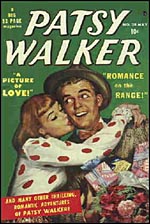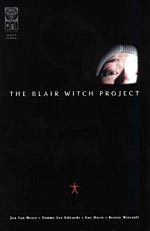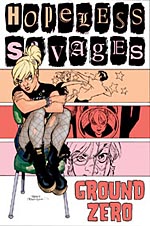>> Top Nine: Wheeler's Choice
>> Comment: 'San Diego', To The Tune Of 'Desperado'
More...

Jen Van Meter has long been a fan of England - the literature, the history and, of course, the music - but she had never actually been to the country before this summer. Ninth Art met up with her in a hotel in London's Mayfair a couple of weeks before the Bristol comic convention. The convention was the main reason for Van Meter and her husband - fellow comics writer Greg Rucka - to come to the UK, but it also served as a chance to see the country first hand, and do a little research.
"Having a character who comes from here and never having been here has been an extraordinary challenge," admits Van Meter, referring to her family comedy HOPELESS SAVAGES' punk patriarch Dirk Hopeless. "Dirk is fun as essentially 'ageing rock star', but the more that I want to work with all of the different things that contribute to who he is, the more I need to think about what sort of childhood he had, and what's his favourite food and things like that. And that stuff completely beyond me, and it's much harder to fake."
The trip has been a revelation for Van Meter. "I used to think of myself as fairly well informed, and I might be more well informed that a lot of people back home, but I have come face to face in the last few days with really how very little I know about what's going on currently in England, About the nuances of history.
"Englishness has its own fanboys and fangirls, which I'm certainly not," she says. "There are Americans building themselves little thatch cottages and investing heavily in Delft because they have this elaborate notion of what it is to be English that they're trying to recreate for themselves. ... I think there's a certain amount of snobbery in the States that says if you're smart you'll go through a period of thinking everything English is superior to everything American. And I certainly had my share of it."
'A lot of our courtship took place on the walk to the comic store.' Van Meter's love of Englishness stems from a love of the literature. "There was a long spell when I thought I wanted to be a Wilde scholar, and I was really heavily invested in English Victorian literature." Although she always planned to write fiction, she also longed for "the academic campus life". She recalls, "I thought, well, if Greg pursues his writing, I'll get my degree, and we'll have this very compatible existence."
But just as she had a passion for literature, she also had a parallel passion for comics, which had begun in the long summer days of her childhood.
"My folks built a cabin about an hour and a half north from where we lived. A place that they had both spent a lot of time as children, and some property had opened up where people could build summer homes. They were schoolteachers, they had the summers off, and so they really wanted to have a place where they could take the kids and get us away from TV.
"Not far from where we built the cabin, there was a little shop where you would go to get your milk and eggs and things like that, and that had a spin-rack. The earliest comic I can remember buying for myself was an issue of JONAH HEX that had such a disturbing cover that I didn't actually open it for about four years.
"Then we went to somebody else's beach house, and there was an end table where probably something like three generations of summering kids had left comics. And there was WEIRD TALES and ROMANCE OF AN URBAN MODEL, that sort of thing. One of the million issues of Superman marrying Lois Lane in some fantasy other dimension or something.
 "And I went through that pile three times, and then I committed one of those innocent childhood collector crimes where I took all of the model comics, [and] they all had paper dolls, so I glued them all to paper and cut them out. Years later I was telling this story to a friend of mine, and I watched his face go pale. I was appalled, I was like, so am I the only person who ever cut out that coupon and sent away for magic itching powder and stuff?"
"And I went through that pile three times, and then I committed one of those innocent childhood collector crimes where I took all of the model comics, [and] they all had paper dolls, so I glued them all to paper and cut them out. Years later I was telling this story to a friend of mine, and I watched his face go pale. I was appalled, I was like, so am I the only person who ever cut out that coupon and sent away for magic itching powder and stuff?"
Her relationship with comics didn't continue uninterrupted, though. The direct market did its best to get in her way. "If it had stayed on the spin-racks I might have been a different kind of reader through junior high and high school, but I didn't live anywhere close to my local comic store, and my memory of the one time I saw it in high school was that it wasn't a very pleasant or friendly place."
The affair resumed in earnest in college. "Somebody gave me that first SWAMP THING run, that run that comes up into Matt Cable's betrayal and all of this amazing darkness and gloom, and I thought, oh my God, I'm in heaven, they're doing WEIRD TALES again. That was what brought me back, that early Vertigo stuff."
At the same time, she also met and fell for Rucka. "He and I knew each other in college. A lot of our courtship took place on the walk from our campus to the comic store. The majority of my friends were also friends of his; the social unit we moved in was the one that was reintroducing me to comics. So one of the many things that we were doing together during that time was reading comics. ... We moved to LA so he could go to grad school, and we were broke, and comics fandom was one of our few affordable hobbies."
The decision to actually write comics crept up on Van Meter. "After college a friend of ours started working for Fantagraphics and was doing the comic shows every summer, and we were broke enough that we weren't buying a lot of comics, but we would make a point of going to the show every summer because it was our opportunity to see these friends when we no longer had college tying us together.
"And every time we would go to the show I would think, there's nothing here I want, it's just to see friends. And every time I would leave with a big sack of stuff, saying, 'I want to do this, I want to make a comic'.
"I had just hit a point at graduate school where I said I really like doing this, I'm good at being a student, but I was starting to see the career path beyond finishing the dissertation, where to get a job you have to move to someplace horrible because they're offering you a tenure-track position, and then you have to leap through lots of hurdles and hoops of fire to get anything like job security.
'I would leave the shows saying, 'I want to make a comic'.' "There are too many people working in my field for it to ever look like an easy path, and I had too many professors and people that I admired who at forty were still waiting to get their life started. I didn't want to put myself up for that forever, and I'm not sure what I want to do next, but I'm pretty sure I'm not going to be an academic.
"That was about the time Greg had been working for Oni and getting things started with them, and we were at a party for kicking off BAD BOY, the Frank Miller one-shot that was Oni's sort-of first foray, and that was where I met Jamie S Rich."
Rich was then working at Dark Horse, but as the former assistant to Oni co-founder Bob Schreck, he was invited along to the party. "[Oni publisher] Joe Nozemack had told him all about me," says Van Meter. "I actually wonder to this day if Joe wasn't doing something kind of Machiavellian. What I do know is, Joe went to Jamie and said, 'You're working on the BUFFY license, right? I know this woman who's a great writer, and she likes BUFFY and she likes comics'. I don't know if he was misunderstanding what I had done this far, or if he was misrepresenting me to give me the shot that he knew that I wanted, but then Jamie gave me the shot."
The BUFFY story led to a short story in DC's horror anthology FLINCH, and that in turn led to another opportunity for Van Meter to revisit her love for horror comics - the BLAIR WITCH movie tie-in for Oni. "That was an amazing experience," notes Van Meter, "and it didn't hurt any of us that that summer people wanted to buy anything that said BLAIR WITCH on it."
A sequel followed the next summer, both on screen and on the page, but THE BLAIR WITCH CHRONICLES didn't repeat the one-shot's success. "The burn out on the movie meant that a lot of people didn't pick it up because it said BLAIR WITCH on it ... and that's unfortunate, because the stories are really not connected at all to the film except they happen in the woods."
 Van Meter's next project to hit the stores would be HOPELESS SAVAGES, but in the meantime, DC invited Van Meter to pitch some story ideas. "I put in a pitch for an Elseworlds piece set in early 20th century Gotham, that was really tied in to my dissertation ... literature by immigrants, how they produced the whole rags to riches why-I-love-America patriotism notion.
Van Meter's next project to hit the stores would be HOPELESS SAVAGES, but in the meantime, DC invited Van Meter to pitch some story ideas. "I put in a pitch for an Elseworlds piece set in early 20th century Gotham, that was really tied in to my dissertation ... literature by immigrants, how they produced the whole rags to riches why-I-love-America patriotism notion.
"I wanted to write a story about what happens if you're somebody like Bruce Wayne but you don't start out rich. So I proposed this story about this immigrant boy who goes west to try to make some money for his family and has come back to find his family has died in a factory fire. It's set against a backdrop of organised labour and theatre people and immigration, and he gets to be really American, and its me trying to work out where a Selina Kyle, where a Commissioner Gordon fits in to this world."
After a nerve-wracking wait, the story was given the green light by editor Denny O'Neill. The 64-page prestige format GOLDEN STREETS OF GOTHAM, with art by Tommy Lee Edwards and Cliff Cheng, should finally see print later this year. "That's a big step between the horror stuff and HOPELESS SAVAGES for me," Van Meter observes, "even though it won't look that way to anyone else."
Oni Press was initially concerned that HOPELESS SAVAGES might be to similar to of its other books. "I had pitched this thing that was initially sort of like these punk rockers have some kids, and these kids are going to take on this big corporation that wants to commodify their parents' image, and I think what they thought was, we can't do GRRL SCOUTS twice.
"So they were sort of hesitant, but not against me coming back to it. When we were doing the summer special they said, we'd like to pair you with Chynna [Clugston Major] and have you do a little thing, maybe like a short test run on the HOPELESS SAVAGES. So I wanted to do a story about when the HOPELESS SAVAGES were little, and the family came together completely differently than they had in the proposal, and it changed the proposal entirely the minute I saw them on paper."
 A revised proposal led to the first HOPELESS SAVAGES series, and a repeat appearance by Van Meter's punk rock family in the 2001 ONI PRESS COLOR SPECIAL. "The nicest thing that I think I heard about last summer's summer special was a short note in e-mail from somebody who essentially said it's so nice to see a story featuring a queer character that's not about the fact that they're queer. And it just fell out naturally.
A revised proposal led to the first HOPELESS SAVAGES series, and a repeat appearance by Van Meter's punk rock family in the 2001 ONI PRESS COLOR SPECIAL. "The nicest thing that I think I heard about last summer's summer special was a short note in e-mail from somebody who essentially said it's so nice to see a story featuring a queer character that's not about the fact that they're queer. And it just fell out naturally.
"I wanted Christine to do a flashback because she was doing all the contemporary stuff ... and at some point I realised that the story is that Twitch and Arsenal are falling for these boys who are brothers. And it didn't occur to me until much later that, I guess for a lot of other writers, it would be, 'now I have to out Twitch', or, 'this is my story about how Twitch became gay', or something. It didn't occur to me until after I'd written it that people weren't going to receive it as just, well, of course Twitch has a first love. Everybody does. It was a strange experience."
The Hopeless-Savage family is back this year in current miniseries GROUND ZERO. "GROUND ZERO goes back to that end table in the beach house, because this is my teen romance story," says Van Meter. "It's all about convoluted errors of manner and misapprehension and misunderstanding and parental angst about children growing up and things like that.
"It's being drawn by Bryan O'Malley, who does a piece of his own that's called LOST AT SEA. His work doesn't look at all like Chynna's. There's an anime influence, but it's completely different. He does all these wonderful little pug nosed people." The second series probably won't be the end for the HOPELESS SAVAGES, either. "I hope people like the second series enough to want more. There's a lot more I want to tell about these people."
But there's other stories Van Meter also wants to tell. "I've been in conversation over an extended period of time with a couple of editors about things they would like me to do, and we're still working out exactly what we can do and what characters we can use.
"One of the hardest things for me about working with either DC or Marvel is that most of the characters I'm interested in are not big sellers, and then you're in this weird space where I'm not the writer yet who can say, well, anything I write will sell. So if I say I want to write this character who has failed multiple times, they say, well, you know, problem, and I understand that, but hopefully we'll work out something where it clicks soon."
Van Meter admits, "I am definitely here because of an opportunity that made itself available through [Greg's] career," but her love for comics and her passion for telling stories are at least the equal of his.
"I don't think I would still be doing it if the only reason was because of Greg," she says. "I can see myself trying comics to see if it would be fun to do the same job as my hubby, but I don't think I would be successful at it if it weren't something I wanted to be doing, and had some kind of knack for, anymore than if I had tried hydraulic engineering because that's what my husband did.
"The opportunity to share an office is just not that attractive," she observes. "Especially if you've seen his office."

This article is Ideological Freeware. The author grants permission for its reproduction and redistribution by private individuals on condition that the author and source of the article are clearly shown, no charge is made, and the whole article is reproduced intact, including this notice.


